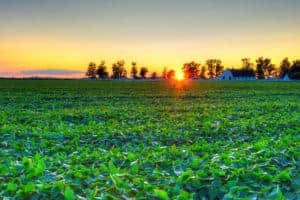After reading Jeanne Marie Laskas great article “Breeding the Perfect Bull” published in the Smithsonian Magazine, I wondered whether a 1031 tax deferred exchange would make sense when selling prize Red and Black Angus, Simmental, Charolais, Hereford, and Senegus bulls. The article is about “Donnell Brown and his fellow cowboys combining modern science with their decades of experience with cattle ranching to create the perfect specimen named Revelation.” Why would a rancher sell a top breeding bull like Revelation? Some of the reasons include genetics, age, injury and the price offered. Ranchers can take advantage of 1031 tax deferred exchanges when selling their animals and purchasing cattle of equal or greater value.
The R.A. Brown Ranch: Creating Top Breeding Bulls
The R.A. Brown Ranch located near the small town of Throckmorton, in East Texas is not your average cattle ranch. Like 97 percent of U.S. cattle ranches, it is also family-owned and operated, passed down to a fifth-generation rancher in a $76 billion beef production industry comprised of about 750,000 independent “cow-calf operations” with fewer than 50 heads. The Brown Ranch operates a 2,000 head farm specializing in breeding. Such ranches are known as “seed-stock providers” representing the beginning of the beef production cycle where genetics determine the qualities of filet mignon, sirloin and steak burgers.
Selling Top Breeding Bulls: Tax Implications
A top breeding bull can sell for $100,000 once their offspring are proven to be prime calves.
What would be the tax implications of the sale? It depends upon the purchase price, the sales price, the depreciation taken and the state capital gains rate. For example, a bull calf purchased for $10,000 and held for five years, depreciation taken for each of the five years resulting in a net adjusted basis of 0. A sales price ranging from $25,000 to $100,000 and selling expenses of $3,000, the estimated tax due is:
| State | Rate | Tax | |||
| $25,000 | $50,000 | $75,000 | $100,000 | ||
| Alabama | 5.00 | 5,400 | 10,400 | 15,400 | 20,400 |
| California | 9.55 | 6,401 | 12,539 | 18,676 | 24,814 |
| Iowa | 8.98 | 6,276 | 12,271 | 18,266 | 24,261 |
| Kansas | 6.45 | 5,719 | 11,082 | 16,444 | 21,807 |
| Kentucky | 6.00 | 5,620 | 10,870 | 16,120 | 21,370 |
| Montana | 6.90 | 5,818 | 11,293 | 16,768 | 22,243 |
| Nebraska | 6.84 | 5,805 | 11,265 | 16,725 | 22,149 |
| West Virginia | 6.50 | 5,730 | 11,105 | 16,480 | 21,855 |
| Wyoming | 0.00 | 4,300 | 8,050 | 11,800 | 15,550 |
Alaska, Florida, Nevada, South Dakota, Washington and Wyoming do not impose a state capital gains tax.
Livestock: 1031 Exchange Benefits and Requirements
If there is intent to replace the bull with like-kind personal property, another bull or multiple bulls, then the taxes due can be deferred in an Internal Revenue Code Section 1031 tax deferred exchange. The IRS like-kind exchange rules require livestock to be:
- Same sex
- Mixed cattle for steer calves
- Cows for mixed yearlings
- Half-blood heifers for three-quarter-blood heifers.
Steps to 1031 Exchange
Before selling or buying in a reverse exchange, talk with your accountant to confirm the estimated capital gains tax. Once you decide to move forward in an exchange, contact a Qualified Intermediary (QI) to ask questions about the exchange and its mechanics. It is important to discuss where the exchange proceeds will be held, if interest will be earned on the account, and what security measures will be in place such as the use of a qualified escrow account and personal identification number to protect the account.
Once the QI is engaged, let them know the contact information of the sale or purchase, perhaps the auctioneer. The QI will prepare exchange documents for the first leg. Exchange funds will be wired to the escrow account under the taxpayer’s tax identification number.
By the 45th calendar day, the replacement property will need to be identified by providing information on the bull(s). The value of the replacement property must be equal to or greater than the net sales price; otherwise a tax is triggered on the difference.
Contact the QI to let them know the details of when you are closing on the replacement bulls. The QI will prepare exchange documents for the second leg wiring the exchange proceeds to the closing.
This content may not be used or reproduced in any manner whatsoever, in part or in whole, without written permission of LANDTHINK. Use of this content without permission is a violation of federal copyright law. The articles, posts, comments, opinions and information provided by LANDTHINK are for informational and research purposes only and DOES NOT substitute or coincide with the advice of an attorney, accountant, real estate broker or any other licensed real estate professional. LANDTHINK strongly advises visitors and readers to seek their own professional guidance and advice related to buying, investing in or selling real estate.









Andy,
Excellent to see your info on other uses of 1031 exchanges especially with a hefty tax rate like you have shown for Kansas. Glad to have this to share with our cattle and livestock producer clients.
Best Wishes,
Marisa
Hi Marisa,
I grew up walking feed lots and barns in the Midwest with my Dad who is a veterinarian. 1031 exchanges apply to productive livestock held for sport, breeding, draft and dairy purposes.
Regards,
Andy
Nice info, always nice to have another option available. Here in GA at a UGA Bull Test Sale un-proven year old bulls sold for as high as $10k last week.
I am pleased the article content is helpful.